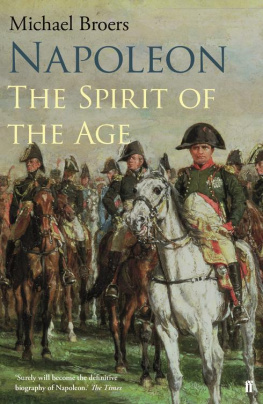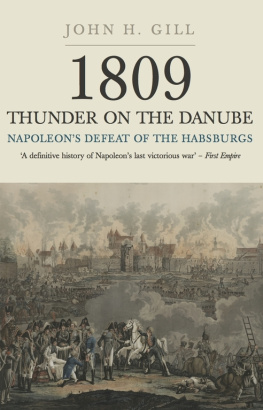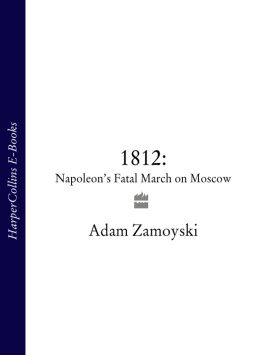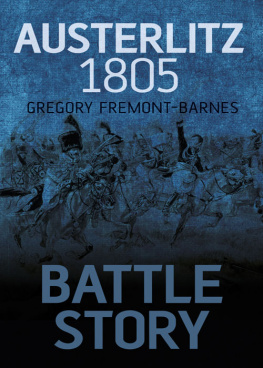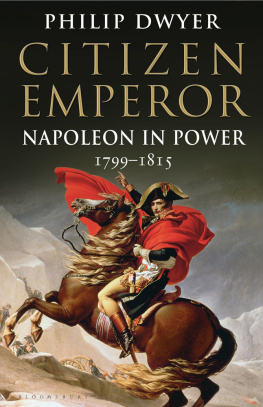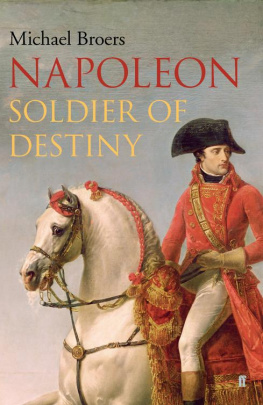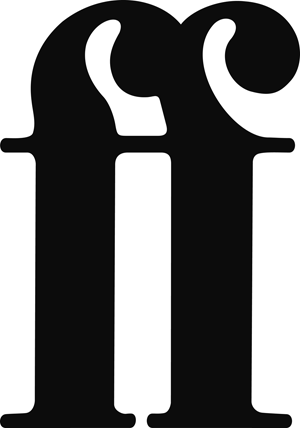Like a wolf upon the fold
A line had been drawn in the last months of 1805, when war began anew on the European continent. The onset of the war of the Third Coalition, when Britain had at last persuaded Russia and the Habsburgs to take the field against France, left a far more indelible mark on Napoleons regime, his empire and his own life than his coronation as Emperor of the French less than a year earlier. Caught off guard, which the protestations of his own myth-making hid so well for so long, Napoleon saw his hand forced by British diplomacy and Austrian belligerence. He now had to risk the hard-won political, social and financial stability his reforms had given to France. Even before a shot had been fired, the costs of war threatened economic recovery and financial rectitude; the re-imposition of conscription on so vast a scale saw the resurgence of rural disorder that showed signs of developing into counter-revolution. Defeat in the field would mean the end of everything personal and political. Until now, Napoleon had presented himself as the new Augustus at Notre Dame on 4 December 1804, as he placed the laurel wreathed crown on his own head. Everything he had done in power, from the conclusion of the second Italian campaign until the outbreak of war, had sought to make safe the world of the prosperous, civilised, gentle masses of granite, for even the catastrophic expedition to reclaim Saint Domingue had been driven by the commercial interests of the merchants of the Atlantic ports and their Parisian bankers; the war with Britain had been portrayed as a struggle to reclaim the sea lanes and the overseas empire for French trade. His political project hinged on ralliement and amalgame, policies of reconciliation, co-operation and live and let live between the factions of the revolutionary decade. The ethos of the Consulate and the first year of the Empire had been, at heart, the lesson Napoleon said he owed to his lawyer father: that men Frenchmen, at least should be reconciled, not estranged from each other.
The war of 1805 ended this. Before it began, Napoleons life had been akin to the wanderings of Odysseus: He had had to outwit monsters and rivals; like Beaumarchais Figaro, his most effective weapon had been his intelligence. Henceforth, his journey and that of his empire and its people, became a different kind of epic, a decade of bitter conflict, the same length as Homers Trojan War. It contained all the stuff of heroic legend: death, gore and suffering on a scale hitherto unknown and unrivalled even in the annals of the Antiquity in which Napoleon and his generation were steeped. It would engender triumph and humiliation of an intensity rivalled only in Greek tragedy, just as its sweep encompassed the length and breadth of a continent. Indeed, it would prove an epic more Wagnerian than Homeric, a struggle to the death with the rest of the world, which would engulf and destroy even Napoleon himself. The intensity of the ten years struggle that began in late 1805 turned friend and foe alike into physical wrecks before their time, having begun their wars as young tyros, only to end them as empty husks. Castlereagh, the foreign minister who did so much to galvanise the British war effort, was born in the same year as Napoleon, 1769, and died the year after his arch-enemy, in 1822; he cut his own throat, but even so censorious an age as his recognised that this intense workaholic had become mentally ill. Napoleons right hand, his stepson Eugne de Beauharnais, died from sheer exhaustion in 1824, at only forty-three. Part of the epic of this blood-drenched decade is Napoleons own physical and, at moments, mental degeneration. From the front ranks of the ghastly butchers yards called battles, to the corridors of power, youth destroyed itself in a prolonged struggle for supremacy. It was not a time of half measures.
In the years covered in this volume, the players in the great game that opened in the last weeks of 1805 were either exposed as inadequate Seen in the cold light of day, however, his military record led few of his peers, friend or foe, to dread him. All this changed in a few bleak winter weeks. No one foresaw it in the wet, cold early winter of 1805.
Fittingly, when it began, the Napoleonic epic did so in a flash, as the armies of the great, old dynastic empires moved on the fledging rouge state, the Empire of the French. Suddenly, Napoleon had to take a new course. Not only had he to turn around physically and strategically in the last weeks of 1805, but psychologically. His mental agility had been tested again, but this time for higher stakes and on a grander scale than ever before. The world would soon learn that, like Giovanni Battista Fidanza, the Ligurian central character of Joseph Conrads Nostromo, that man could command himself even when thrown off his balance
Above all, this is the story of a general and his army, of their rampage across the old continent of Europe. If the young emperor of the west struck ruthlessly and swiftly, it was because of his new masterpiece, now rechristened la Grande Arme. Napoleons men
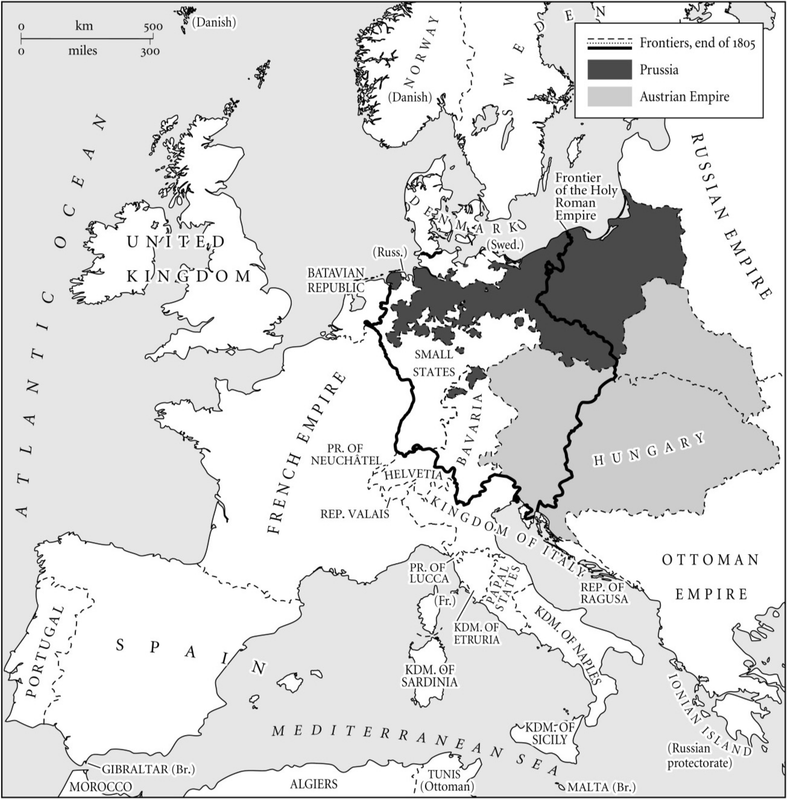
Map 1. Europe in 1805
NOTES
For a succinct analysis of Napoleons use of the press, and the counter-blasts from the right: Annie Jourdan, Napolon: Hros, imperator, mcne (Paris, 1998), pp. 7784.
Joseph Conrad, Nostromo (Oxford, 2009), p. 414.
The title of Alan Forrests incomparable social history of the Grande Arme: Napoleons Men: The Soldiers of the Revolution and Empire (London, 2002).
The War of 1805
The military and diplomatic events of 18035 had not been an unqualified success for Napoleon, to say the least. He had been out of his ken when dealing with Toussaint and his lieutenants, and likewise with Jefferson and Madison; he had in every sense been out of his depth when confronted by Nelsons navy. He was very much in his element in the Channel camps, but from the moment the tent was struck in Boulogne and the march to the Rhine began, Napoleon put all his failings behind him. A few days before he broke camp at Boulogne, he told Cambacrs, The fact is that this power [Austria] is arming; I want her to disarm; if she doesnt, I will have 200,000 [men] pay her a visit she will remember for a very long time. Even Napoleon could not have realised what he had said. When the fighting began, he became elemental.

